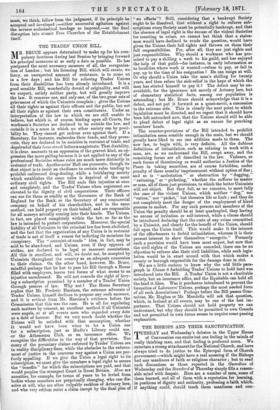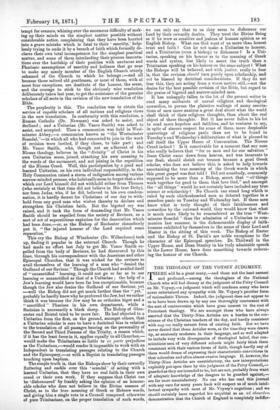THE BISHOPS AND THEIR SANCTIFICATION.
TUESDAY and Wednesday's debates in the Upper House of Convocation can excite but one feeling in the minds of really thinking men, and that feeling is profound scorn. We entertain a strong attachment for the National Church, and have always tried to do justice to the Episcopal form of Church government—which might have a real meaning if the Bishops had any manliness of faith or religious character ; but to read such discussions as those reported in the Guardian of Wednesday and the Standard of Thursday simply fills a reason- able mind with despair. Here are, a number of men, some of them learned, and all of them with a reputation for learning, in positions of dignity and authority, professing a faith which, if anything could, should teach them manliness . and con-
tempt for censure, whining over the enormous difficulty of mak- ing up their minds on the simplest matter possible without considerable notice, complaining that they have been hurried into a grave mistake which is fatal to their sanctity,' help- lessly trying to undo it by a breach of faith which formally de- clares their own total incompetence for the simplest practical matter, and some of them interlarding their piteous lamenta- tions over the hardship of their position with unctuous and Pharisaic assumptions of sanctity and holiness that go near to make any manly member of the English Church utterly ashamed of the Church to which he belongs ;—and all because these mitred old gentlemen, or most of them, with at most four exceptions, are destitute of the honour, the sense, and the courage to stick to the obviously wise resolution deliberately taken last year, to get the assistance of the genuine scholars of all sects in the revision of the new translation of the Bible.
The perplexity is this. The resolution was to obtain the service of capable scholars of all nations and religious views in the new translation. In conformity with this resolution, a - Roman Catholic (Dr. Newman) was asked to assist, and declined ; and a Unitarian (Mr. Vance Smith) was asked to assist, and accepted. Then a communion was held in West- minster Abbey,—a communion known as " the Westminster Scandal,"—in which all who had consented to join in the work of revision were invited, if they chose, to take part ; and Mr. Vance Smith, who, though not an adherent of the Nicene theology, believes in the "divinity " of Christ in his own Unitarian sense, joined, attaching his own meaning to the words of the sacrament, and not joining in the repetition of the Nicene Creed. Well, this participation by a good and learned Unitarian, on his own individual responsibility, in the Holy Communion raised a storm of indignation among various narrow-minded persons, who habitually seem to forget that a rite which our Lord himself did not withhold either from Thomas (who certainly at that time did not believe in His true Deity), nor from Judas, who, if he did, believed to his own condem- nation, it is hardly decent for Christians of our day to with- hold from any good man who wishes thereby to declare and strengthen his Christian faith. But the bigoted cry was raised, and it took the form of demanding that Mr. Vance Smith should be expelled from the society of Revisers, as a sort of act of superstitious expiation for the desecration which had been done,—or, as the Bishop of Rochester shamelessly put it, " the injured honour of the Lord required some reparation."
This cry the Bishop of Winchester (Dr. Wilberforce) took up, finding it popular in the external Church. Though he had made no effort last July to get Mr. Vance Smith ex- pelled from the body of Revisers, he had discovered by this time, through his correspondence with the American and other Episcopal Churches, that it was wicked for the revisers to avail themselves of the learning of a man who " denied the Godhead of our Saviour." Though the Church had availed itself of " unsanctified " learning, it could not go so far as to use learning so unsanctified as that of a Unitarian ; the help of a Jew's learning would have been far less exceptionable, because though the Jew also denies the Godhead of our Saviour, yet —well the Bishop did not get much farther than the "yet," probably he hardly knew why he preferred the Jew, but we rather think it was because the Jew may be an orthodox bigot and a " sanctified " Pharisee in his own department, while a Socinian is necessarily a black sheep. The Bishop of Glou- cester and Bristol tried to be more fair. He had objected to a Unitarian from the first, on the ground, amongst others, that a Unitarian scholar is sure to have a doctrinal bias in relation to the translation of all passages bearing on the personality of the Second and Third Persons of the Trinity, a reason which, if it has the least force in it, applies equally to all Churches,— would make the Trinitarians as liable to ex parte prejudices as the Unitarians,—would render it impossible to work with an Independent in translating passages relating to the Church and the Episcopacy,—or with a Baptist in translating passages touching upon baptism.
The simple truth is, that the Bishops show by their cowardly fluttering and cackle over this scandal' of acting with a learned Unitarian, that they have no real faith in their own creed or their own work. If they suppose that Christ can be 'dishonoured' by frankly asking the opinion of an honour- able scholar who does not believe in the Divine essence of Christ, as to the true meaning of Greek or Hebrew words, and giving him a single vote in a Council composed otherwise of pure Trinitarians, on the proper translation of such words, we can only say that to us they seem to dishonour our Lord by their cowardly doubts. They treat the Divine Being as if he were as sensitive and jealous of human opinion as an English Bishop. What can God want of us more than honest trust and faith ? Can he not make a Unitarian to honour, and a Trinitarian (even a bishop) to dishonour I Is a Uni- tarian, speaking on his honour as to the meaning of Greek words and syntax, less likely to assert the truth than a
Trinitarian speaking on his honour on the same subject I What the Bishops will be believed, and with justice, really to fear is, that the revision should turn purely upon scholarship, and not be biassed by doctrinal considerations. If they do not fear this, they are acting from a worse motive still,—not the desire for the best possible revision of the Bible, but regard to the praise of bigoted and narrow-minded men.
It has unhappily fallen to the lot of the present writer to read many outbursts of unreal religious and theological cowardice, to peruse the plaintive wailings of many associa- tions of men more anxious a great deal about what the world shall think of their religious thoughts, than about the real object of those thoughts. But it has never fallen to his lot
to read more hopeless and faithless, and he ventures to say, in spite of sincere respect for some of them, more despicable quaverings of religious panic than are to be found in Tuesday's and Wednesday's deliberations of what is pleased to call itself the Upper House of Convocation. The Nicene Creed indeed ! Is it conceivable for a moment that any man• who really believes that " for us men and for our salvation
Jesus Christ came down from heaven, and was incarnate in our flesh, should shriek out treason because a good Greek scholar, who does not believe this, is asked to help towards ascertaining the true meaning of the Greek words in which this great gospel was first told ? Did not somebody, commonly
supposed to be more than a Bishop, assert that "all things work together for good to them that love God," and amongst the " all things " would he not certainly have included any true-
science or scholarship ? No Church can stand long which is ruled by such chickenhearted men as debated together in a senseless panic on Tuesday and Wednesday last. If these men knew what is truly thought of their faithlessness and cowardice by the outward world, they would know that what is much more likely to be remembered as the true " West- minster Scandal " than the admission of a Unitarian to com- munion last summer, is the dishonourable display of faith- lessness exhibited by themselves in the name of their Lord and Master in the sitting of this week. The Bishop of Exeter and the Bishop of St. David's are noble exceptions to the character of the Episcopal speeches. Dr. Thirlwall in the Upper House, and Dean Stanley in his truly admirable speech in the Lower House, have done something towards redeem- ing the honour of our Church.



































 Previous page
Previous page